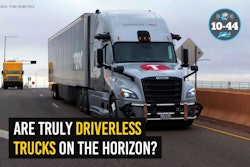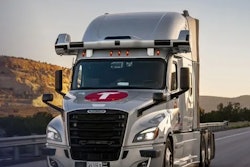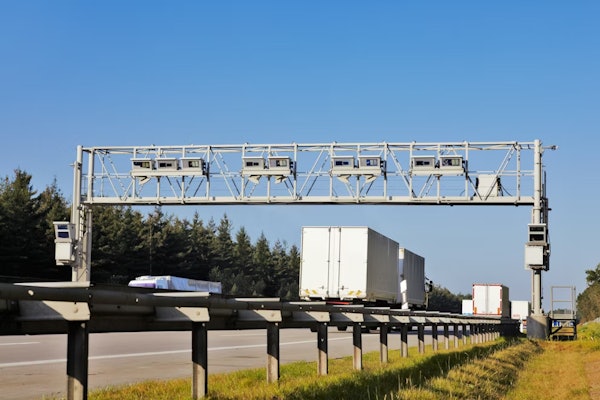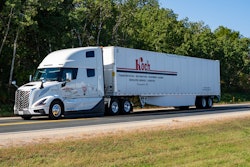Trucking news and briefs for Thursday, Jan. 9, 2025:
Aurora partners with Continental, Nvidia to deploy autonomous trucks at scale
Aurora, Continental, and Nvidia this week announced a long-term strategic partnership to deploy driverless trucks at scale, powered by the next-generation Nvidia DRIVE Thor system-on-a-chip (SoC).
Nvidia’s DRIVE Thor and DriveOS will be integrated into the Aurora Driver, an SAE Level 4 autonomous driving system that Continental plans to mass-manufacture in 2027.
“Delivering one driverless truck will be monumental. Deploying thousands will change the way we live,” said Chris Urmson, CEO and co-founder at Aurora. “Nvidia is the market leader in accelerated computing, and they’ll strengthen our ecosystem of partners and our ability to deliver safe and reliable driverless trucks to our customers at scale.”
Autonomous truck manufacturer Aurora is in the final stages of validating the Aurora Driver for driverless operations on public roads. The Aurora Driver is equipped with a powerful computer and sensors, including lidar, radar, and cameras, enabling it to safely operate at highway speeds. Verifiable AI enables the Aurora Driver to quickly adapt to new operating domains while being validated through Aurora's Safety Case, an essential tool for regulatory trust and public acceptance. Aurora plans to launch its driverless trucking service in Texas in April 2025.
Nvidia will power the primary computer of the Aurora Driver with a dual Nvidia DRIVE Thor SoC configuration that runs DriveOS. DRIVE Thor is designed to accelerate inference tasks critical for autonomous vehicles to understand and navigate the world around them. As Continental and Aurora prepare to manufacture self-driving hardware at scale in 2027, production samples of DRIVE Thor are coming in the first half of 2025.
Continental is developing a reliable, serviceable, cost-efficient generation of the Aurora Driver hardware, specifically for high-volume manufacturing. The company is also developing a specialized independent secondary system that can take over operation if a failure occurs in the primary Aurora Driver computer. With start of production planned for 2027, Continental will test prototypes of the future hardware kit in the coming months. Continental will then integrate DRIVE Thor with DriveOS into the primary Aurora Driver computer at its manufacturing facilities and ship the full hardware kit to Aurora’s truck OEM partners for integration into customers’ trucks.
Four more states issue emergencies over winter weather
Following recent emergency declarations in seven states as a result of winter weather across the country, four more states have followed suit.
Iowa Gov. Kim Reynolds issued an emergency declaration waiving the hours-of-service regulations within Iowa Code 321.449 for crews and drivers delivering propane, diesel No. 1, diesel No. 2, natural gas and other fuels used for residential, agricultural and commercial heating purposes. Reynolds cited high demand for petroleum products throughout the Midwest, as well as the need for access to motor and heating fuels to continue to process and dry harvested crops and to provide residential heating.
In Maryland, Gov. Wes Moore issued a state of emergency, waiving HOS regulations for drivers providing direct assistance related to the winter storm.
An emergency declaration issued in New Hampshire waives HOS rules for motor carriers and drivers delivering propane and home heating oil to homes and businesses within the state.
Finally, North Carolina Gov. Josh Stein in an emergency declaration said the ongoing impacts of Hurricane Helene, along with anticipated impacts of prolonged cold weather, have increased demand for drivers hauling propane and other heating fuels. As such, the declaration waives the maximum driving time regulations for drivers transporting propane or essential heating fuels in the emergency area.
[Related: Winter weather prompts slew of emergencies, waiving hours and other regs]
FMCSA’s random drug, alcohol testing rates unchanged for 2025
The Department of Transportation announced Tuesday that the minimum random drug and alcohol testing rate for safety-sensitive employees will remain unchanged in 2025 from 2024 for most agencies.
For Federal Motor Carrier Safety Administration-regulated workers, the random drug testing rate will remain at 50%, while the random alcohol testing rate will remain at 10%. FMCSA’s random testing rate last changed in 2020.
This means that carriers are required to perform random drug tests at a rate equivalent to half their number of drivers. This includes the number of leased owner-operators a carrier contracts with, as well as owner-operators in a testing consortium.
[Related: DOT proposes change to drug-testing rules]
Cargo Transporters names new recruiting, marketing VP
Cargo Transporters (CCJ Top 250, No. 163) this week announced the promotion of Shelley Dellinger to Vice President of Recruiting and Marketing.
 Shelley DellingerCargo Transporters
Shelley DellingerCargo Transporters
Dellinger brings a wealth of experience to her new position, having served as Director of Recruiting and Marketing since October 2022. Her tenure at Cargo Transporters began in 1992, and over the years, she has held various key roles, including Customer Service Manager and Director of Recruiting and Retention. Her extensive background in recruiting and her dedication to the trucking industry have been instrumental in the company's growth and success.
"With Shelley's strong background in recruiting and her dedication to the trucking industry, she will continue to excel in her new role," said Meredith Priestley, Chief Legal Officer of Cargo Transporters. "As VP of Recruiting and Marketing, Shelley will work closely with the leadership team to understand the company's current and future needs and create and implement strategies to meet those needs."












